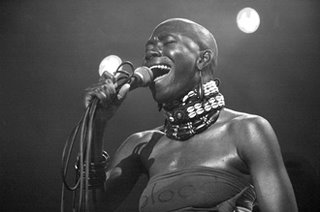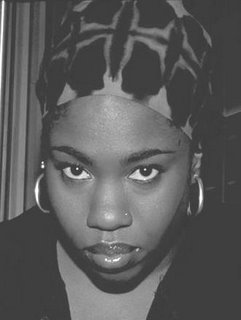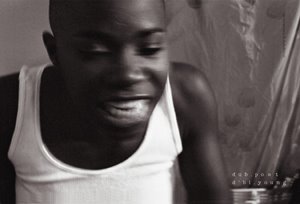 I was at the launch of d'bi young's new/first book of poems last night at the Lula Lounge. I had expected the event to be a love-in, but instead was greeted with a snapshot of a community in action -- Toronto's dub poetry, or dubpoetry as Klyde Broox insists, community. Hailing from the Jamaican dance hall and reggae traditions, dub poetry has kept its roots firmly planted in the musical tradition, but with an obvious acceleration of the textual dynamics. One part story-telling, one part exhortation, and one part the pure bliss of rhythm, dub poetry serves first and foremost the community from which it emerged. I was struck through the evening of performers how each insisted on a historical consciousness of a collectivity they were obviously deeply invested in. Africa, 500 years of resilience, Haile Selassie, and Jah -- the protagonists. Racism, American dreams, and the slave ships -- the antagonists. There was no smoke in the air, but rather cocktails and wine and juice. Children were running around, lots of laughter and hugs. It was most decidedly a community event.
I was at the launch of d'bi young's new/first book of poems last night at the Lula Lounge. I had expected the event to be a love-in, but instead was greeted with a snapshot of a community in action -- Toronto's dub poetry, or dubpoetry as Klyde Broox insists, community. Hailing from the Jamaican dance hall and reggae traditions, dub poetry has kept its roots firmly planted in the musical tradition, but with an obvious acceleration of the textual dynamics. One part story-telling, one part exhortation, and one part the pure bliss of rhythm, dub poetry serves first and foremost the community from which it emerged. I was struck through the evening of performers how each insisted on a historical consciousness of a collectivity they were obviously deeply invested in. Africa, 500 years of resilience, Haile Selassie, and Jah -- the protagonists. Racism, American dreams, and the slave ships -- the antagonists. There was no smoke in the air, but rather cocktails and wine and juice. Children were running around, lots of laughter and hugs. It was most decidedly a community event.The night itself began with a documentary on d'bi young by Judy Singh called "blood: the matriarch and dub poetry." The film was funded by Bravo. It focussed on the matriarchal line of dub poets and story-tellers that d'bi young descended from. She literally grew up in stories of Anansi, half on the stage with her mother, Anita Stewart, in Kingston, Jamaica. The two immigrated to Canada, and Stewart now lives in Brampton. The film ended with a very touching mother-daughter duet, singing to each other on the couch: "Ever since I was stolen from Africa ... Africa ..."
First performer up was Lillian Allen, the petit grand dame of dub poetry in Toronto, two time Juno award winner, and founder of the Dub Poetry Collective. She read two poems, including one from Psychic Unrest (Insomniac) on the trials and non-convictions of a Rastaman biking down Eglinton. Her vocal range and performance timing was impeccable. She definitely provided the comic highlight of the night -- as the rastaman rode off into the concrete night leaving a trail of weeping policemen, befuddled judges, and delighted jurors in his wake. It reminded me of a Sam Shepherd story, only tighter as a narrative poem.
 Motion's more hiphop inflected performance, complete with a masterful beatbox, spun a web of history and context into this socially conscious work. I've seen her perform before, but this particular piece was far superior to all that I've seen previously. Humour, wit, musical and literary allusions, all in vibrant performative mode. The crowd roared as she stepped down, and the spotlight switched the centre of the dancefloor where Byron Beckford, from Jamaica, performed a rumbling but somehow silky dance. I have no vocabulary to talk about dancing, but it was moving and exciting and transformative.
Motion's more hiphop inflected performance, complete with a masterful beatbox, spun a web of history and context into this socially conscious work. I've seen her perform before, but this particular piece was far superior to all that I've seen previously. Humour, wit, musical and literary allusions, all in vibrant performative mode. The crowd roared as she stepped down, and the spotlight switched the centre of the dancefloor where Byron Beckford, from Jamaica, performed a rumbling but somehow silky dance. I have no vocabulary to talk about dancing, but it was moving and exciting and transformative.I was speaking with Lillian Allen when Anita Stewart took the stage. Apparently, it was a special and uncommon event that she read -- Allen said it had been over a decade at the least. She looked like a young mother, proud, and smiling -- read competently and was joined by d'bi for another touching performance of the song from the documentary. This one was more polished and choreographed, however, and involved short dialogues and maternal exchanges -- mostly Stewart teasing Young for getting too excited about the political content of the song.

When d'bi read alone she began her performance with a joke, quoting her mother telling her years earlier to "Never, don't you ever go on stage with your book." d'bi had her new book and read a few works from it, eventually joined in turn by a drummer, then a beatboxer, then a handdrummer, and eventually a full 8-piece reggae band -- the dubbin.revolushun.gangstars. She performed a few tracks that I recognized from her previous CDs, and at least one from the album due out this summer (available on her website). "Blood" is still my favourite track of hers, for its originality. They all have a distinct intensity, but some of the other songs rely too heavily on the rhetoric without resonance. Regardless of what flaws I could identify in their lyrical composition, imagining them on the page as they flew through the air, they were all exceptional as performative, communitarian acts of solidarity.
I have been trying to figure out what to make of the dub poetry community for a while now, and last night was entirely instructive. I've heard the many criticisms from the 'avant' crowd -- that they are resolutely, irreparably, confessional, lyrical, unsophisticated, etc, etc. Some of these criticisms definitely hold true (a similar, if slightly varied, list could be drawn up for any poetry crowd). What I realized last night, however, courtesy of d'bi young's outspoken comments on the issue, was that I was witnessing a working-class literary tradition. It brought to mind images of Joe Wallace reading to crowds of thousands of workers, or Dorothy Livesay and Milton Acorn and Earl Birney contributing to social justice and communist causes through their poetry. The connection between the dub performers and their issues/ideas/politics and their audience was perfect and indelible.
There was a time in this country when famous aristocratic doctor's like Osler worked with Prime Ministers and socialists and artists, when artists like Fritz Brandtner and F.R. Scott and Norman Duncan and Oscar Ryan moved back and forth between political activism and aesthetic endeavours; when the avant-garde and the workers movement writers were, if not one and the same, at least of the same herd. Somehow the avants have pulled away from the working-class writing tradition. Although, George Elliott Clarke was there last night, and he certainly crosses the line. Lillian Allen also told me a number of amazing stories about bpNichol, with whom she was friends. She was openly moved by her memories of beep, and was obviously deeply touched by his support of her art. Maybe the line between aesthetic communities is indeed as close as it ever was, despite the jaundiced few. The potential for a relevant political art was certainly unquestioned last night.

0 Comments:
Post a Comment
<< Home